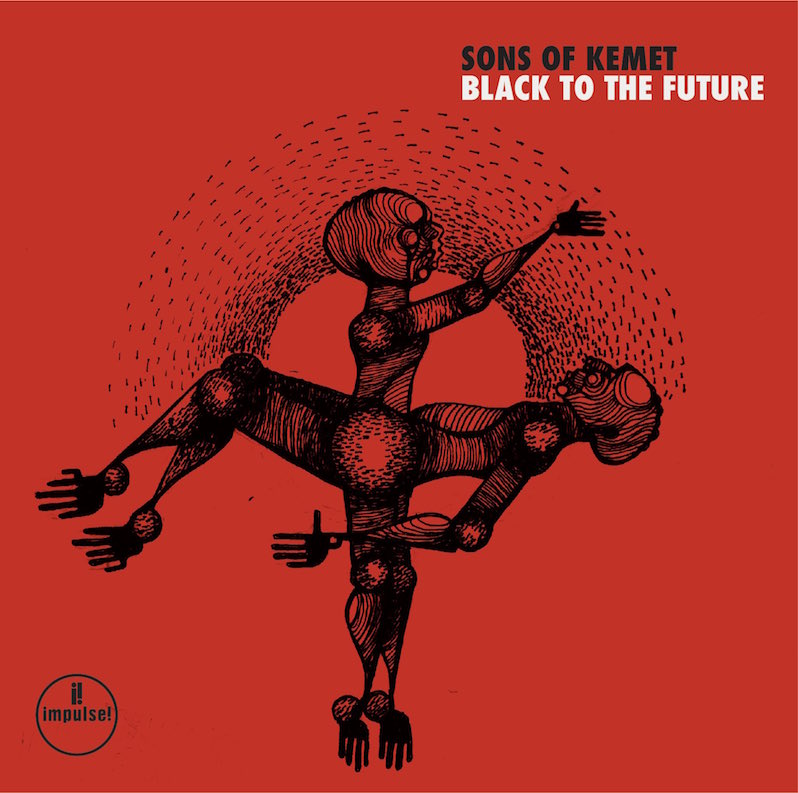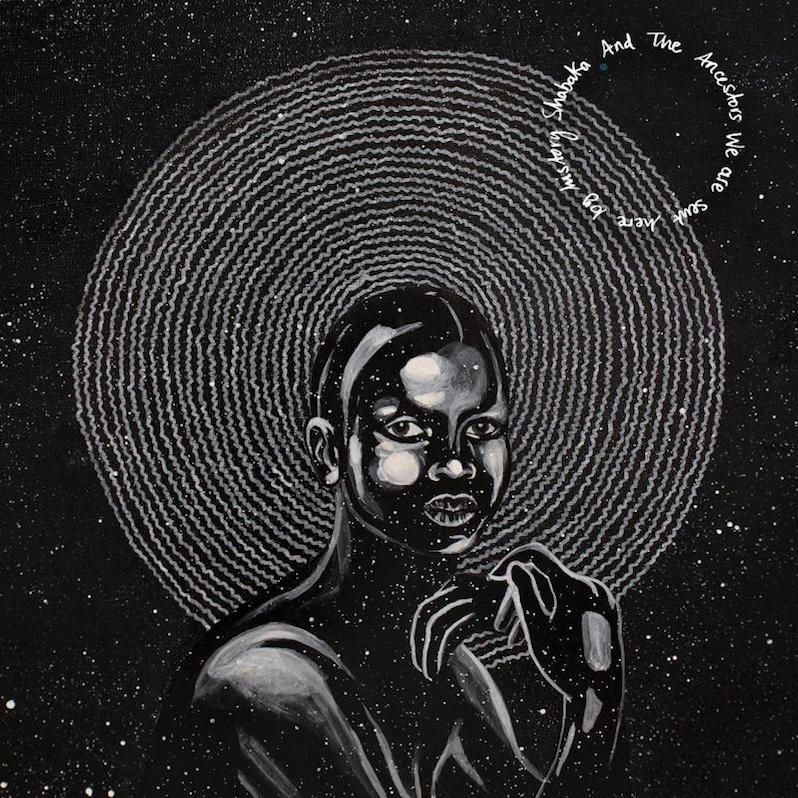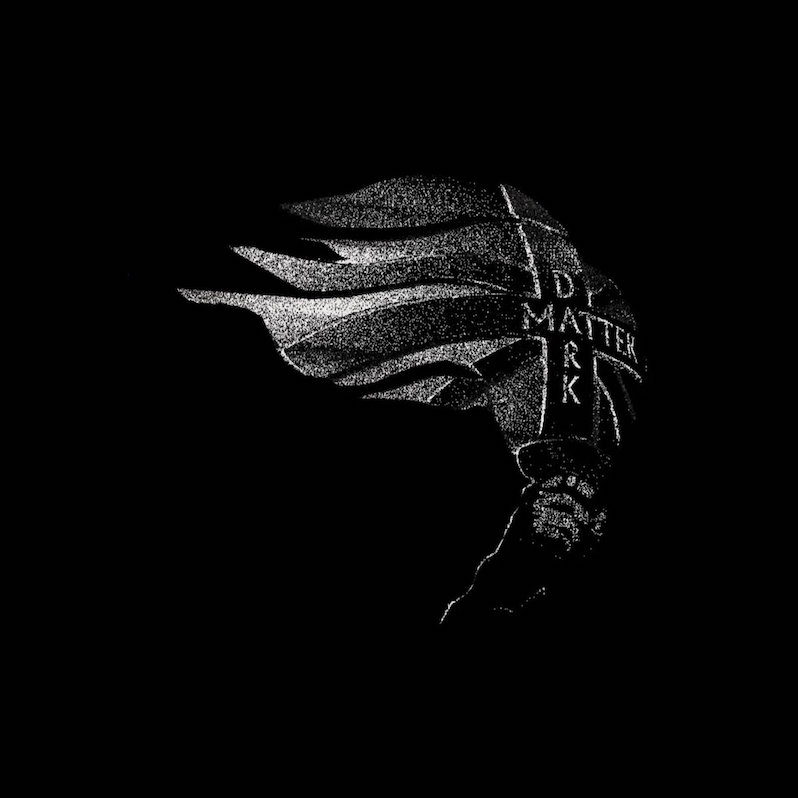Sons of Kemet – Black to the Future

The fluidity of jazz is central to its sound, both in the way that different players and soloists interact with different ensembles and different-sized ensembles and the way that one composition will never be played or heard the same way twice. The mutability of it, the constant motion and tendency toward evolution is in part why so many of its legendary figures didn’t stick with one group of players for too long, as well as how someone like London musician Shabaka Hutchings can play with three very different groups—The Comet Is Coming, Shabaka & The Ancestors and Sons of Kemet—at one time, rotating a new album with each every year.
Sons of Kemet, however, is very much a band in the traditional sense. The tight, rhythmic quartet of Hutchings, Theon Cross, Tom Skinner and Edward Walicki-Hick form both the foundation and often the whole of its sound, their Afro-Carribean pulse and heavy soca influence driving an accessible and muscular form of jazz that’s built from the interplay between them. Which is what makes the group’s third album Black to the Future feel like a significant departure from the group’s two previous albums; the list of contributing musicians is the longest on any Sons of Kemet album, with guests such as Moor Mother, Angel Bat Dawid, Lianne La Havas, Kojey Radical, D Double E and Joshua Idehen adding new voices and voicings to the group’s approach in pursuit of a vision of transcendent Afrofuturism.
There’s no mistaking the band at the center of it all. On a purely compositional level, these tracks often feel like they pick up where those on 2018’s Your Queen Is a Reptile left off, built on a rock-solid backbone of deep tuba basslines and the deceptively light and nimble work of the group’s duo of percussionists. So when outsiders become embedded in the group’s upbeat swirl of calypsonian funk and alternately powerful and densely dreamy melodicism, their presence often provides another layer of hypnotic rhythm, even when pushing forward the album’s overall ideas of bridging past and present, struggling and striving. The most striking of these moments is “Pick Up Your Burning Cross,” featuring Moor Mother and Angel Bat Dawid, its grand collision of sound and frenetic rhythms sounding bigger than anything the group has ever done before. And on “Hustle,” grime emcee Kojey Radical spits his way through a steady stream of laments (“God got my blessings on auto-pilot/Why ain’t no one tell me peace of mind was pricey?“) against Cross’s heavy low-end backing. It’s the closest to a proper pop song in Kemet’s catalog, as well as the one here with the most striking refrain: “Born from the mud with the hustle inside me.”
The slightly-greater-than-half the album that solely comprises Sons of Kemet on their own narrows their circle and hones in on a strictly musical form of transcendence. Where vocalists such as Moor Mother and Kojey lay the foundation for a narrative of liberation and empowerment, the group set their sights on even further exploration and transformation. “To Never Forget the Source” is the most direct and accessible of these moments, driven by minor-key melodies and a percussive strut, while there’s a spiritual mysticism to “In Remembrance of Those Fallen” that feels akin to Hutchings’ cosmic work with The Ancestors. Hutchings pushes himself to new levels of dissonance on “Let the Circle Be Unbroken,” his horn shredding, squeaking and squawking with ferocity and intensity that speaks to a pain and anger that lies at the underside of the hope and healing at the center of the album. But it’s a mesmerizing beauty that the band returns to on “Envision Yourself Levitating,” the album’s longest track as well as its most gorgeously soaring.
Black to the Future begins and ends in much the same way its predecessor does, with poet Joshua Idehen providing both prologue and epilogue to the group’s spiritual journey through vivid and fiery verses. On “Field Negus” he rages against hundreds of years of colonialism, enslavement and tragedy (“You had me saying prayers in your language/you had me forget my gods/You had me question my spirits“), and on closer “Black,” he circles back to some of the verses he used on The Comet Is Coming’s “Imminent” (“This black pain is dance, this black struggle is dance“) in a plea to simply be left alone. They’re the most tense moments on record, but Idehen and Sons of Kemet work in concert, seamlessly, as do all of the guests who deliver their performances behind the mic here. At their core, Sons of Kemet is a quartet, and it’s what they create between the four of them that ultimately make the 11 stunning songs on Black to the Future what they are. But they’re not fixed either, proving that the size and shape of the ensemble can expand and contract, ebb and flow, but the power and poignancy of what they craft doesn’t waver.
Label: Impulse!
Year: 2021
Similar Albums:
Jeff Terich is the founder and editor of Treble. He's been writing about music for 20 years and has been published at American Songwriter, Bandcamp Daily, Reverb, Spin, Stereogum, uDiscoverMusic, VinylMePlease and some others that he's forgetting right now. He's still not tired of it.




